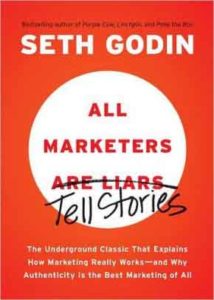Great Business Blog Stories Are Rarely Aimed at Everyone

“Consumers are used to telling stories to themselves and telling stories to each other, and it’s just natural to buy stuff from someone who’s telling us a story,” observes Seth Godin in his latest book All Marketers Tell Stories.
Not all stories succeed, Godin points out, because not all stories have the following essential elements:
- Great stories are authentic
- Great stories promise fun, money, safety, or a shortcut.
- Great stories are subtle, allowing the target audience to draw their own conclusions.
- Great stories happen fast, engaging the consumer the moment the story clicks into place.
- Great stories appeal not to logic, but to the senses.
Each of these principles is important for effective business blog content writing, to be sure. Today, though, for the benefit of my target audience, I want to highlight Godin’s most cryptic (and, I think, most interesting) statement: Great stories are rarely aimed at everyone.
“Average people,” Godin says, are good at ignoring you. If you need to water down your story to appeal to everyone, it will appeal to no one.” It’s not that marketing no longer matters, the author says. In fact, it matters so much that we have an obligation to do it right. But “no marketing succeeds if it can’t find an audience that already wants to believe the story being told.”
As writers, then, when we tell the story of a business or a practice to consumers, we “frame” that story a certain way. A frame, Godin explains, is the way you hang a story on to a consumer’s existing world view. Smart marketers, he’s saying, don’t try to use facts to prove their case, insisting that people change their biases. “Your opportunity,” he tells marketers, “lies in finding a neglected worldview, framing your story in a way that this audience will focus on.”
Translated into blog content writing insights, I want to underline Godin’s three elements, the three things he claims will determine the success or failure of our efforts:
- Attention: If our readers’ worldview is that they don’t think they need what we’re marketing, and don’t recognize a lack or a need, they won’t notice our solution.
- Bias: Predispositions may color our information negatively in readers’ minds through no fault of our own.
- Vernacular: Consumers care about the “how” as much as the “what”. If our story doesn’t match what the consumer thinks is fitting, “weird things happen”.
“Small businesses can effectively compete with large companies by targeting a niche market,” writes Mandy Porta in Inc. Magazine. “Target marketing allows you to focus your marketing dollars and brand message on a specific market that is more likely to buy from you than other markets.” At Say it For You, one principle we try to keep in mind is:
“Great business blog stories are rarely aimed at everyone!”

Follow us online!